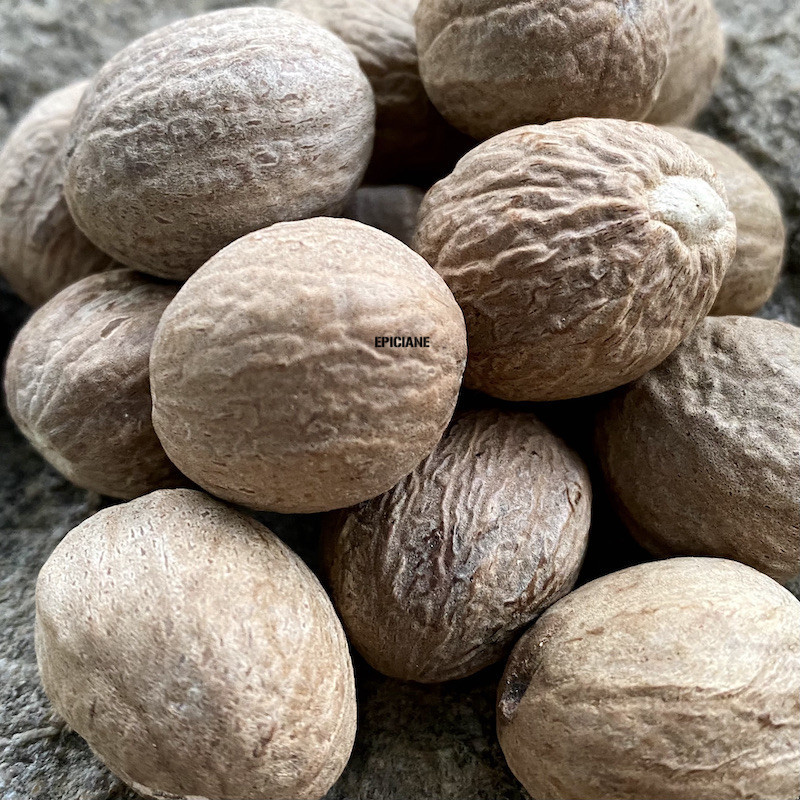
Reference: hypocras


Its distinctive flavor, both woody and exotic with hints of smoky notes, has become essential to Western cuisine.
It is inseparable from gratins, purees, béchamel sauces, quiche lorraine, and even gingerbread.
 Delivery
Delivery
Mondial Relay
 Returns
Returns
See conditions
 Payments
Payments
100% secure
Livré en sachet refermable
°°°
Uses in Cooking and Beyond:
Nutmeg is typically grated to add its unique flavor to meats, purees, béchamel sauces, stuffing, gratin dauphinois, quiche lorraine, charcuterie, and pastries like gingerbread. It can also be cut into pieces for infusing in alcohols or other liquids.
Nutmeg is a key component in the "four-spice" blend and is featured in various exotic spice mixtures, including some curries. It pairs well with cloves, cinnamon, and chili peppers—in fact, almost any spice! Nutmeg complements both savory and sweet dishes beautifully and withstands cooking heat without losing its distinct taste.
Interestingly, nutmeg is also an ingredient in Coca-Cola.
Who am I?
Origin: Indonesia
Scientific name: Myristica fragrans
Nutmeg is the fruit of the nutmeg tree, a tropical tree in the Myristicaceae family, which can reach heights of 10 to 15 meters. The tree produces orange flowers, followed by yellow-orange fruits that split open when ripe, revealing nutmeg seeds.
Nutmeg, as we know it, resembles a walnut in structure. The fruit is a large husk, which is inedible. Inside, a vivid red skin when fresh (and light brown once dried), called mace, partially covers the nutmeg. Beneath this "skin" lies a hard shell that must be cracked open to access the nutmeg seed we consume—a real "Russian doll" setup!
At high doses, which are impossible to reach in cooking, nutmeg is toxic and can cause hallucinations, high fevers, and severe indigestion. However, don't worry—the required quantities are so large that they would be impossible to ingest, even intentionally.
A Bit of History:
Originally, nutmeg trees were found only on Banda Island in the Moluccas Archipelago in Indonesia. In the 15th century, the Portuguese attempted to dominate the spice trade, but it was the Dutch, through the "Dutch East India Company," who eventually expelled the Portuguese and imposed their monopoly, tragically committing massacres against the native population.
Much later, nutmeg trees were exported to the Caribbean and Grenada, where they adapted successfully.
Data sheet
 Anne Marie P.
Anne Marie P.
Bien
 Virginie M.
Virginie M.
Top

 Anne Marie P.
Anne Marie P.
Bien
 Virginie M.
Virginie M.
Top

Reference: hypocras
Reference: 3N7153402
Reference: 208033101
Reference: 1N6987004
Reference: 00033929-0001
Reference: 30803202
Reference: gingembreE
Reference: 20815801
Reference: Harissa
Reference: badianeM
Reference: gingembreM
Reference: 3N7153402
Reference: 20721302
Reference: 208037910
Reference: 00029083-0001
Reference: 208033101
Reference: 10N7738802
Reference: EPI2301001
Reference: 20721301

Its distinctive flavor, both woody and exotic with hints of smoky notes, has become essential to Western cuisine.
It is inseparable from gratins, purees, béchamel sauces, quiche lorraine, and even gingerbread.